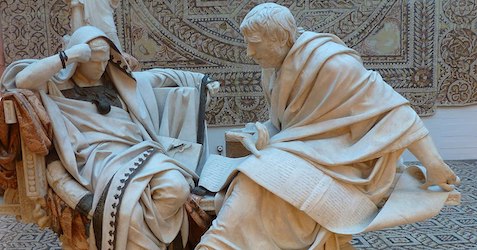
Seneca. Or Lucius Annaeus Seneca the Younger, was a Stoic philosopher of Ancient Rome, a statesman, dramatist, and in one work, satirist, from the post-Augustan age of Latin literature.
Seneca was born in Corduba in Hispania and was trained in rhetoric and philosophy in Rome. His father was Seneca the Elder. In AD 41, Seneca was exiled to the island of Corsica under emperor Claudius but was allowed to return in AD 49 to become a tutor to Nero.
When Nero became emperor in AD 54, Seneca became his advisor and helped provide competent government for the first five years of Nero’s reign. Seneca’s influence over Nero declined with time.
In AD 65 Seneca was forced to take his own life for alleged complicity in a conspiracy to assassinate Nero, of which he was probably innocent. Seneca’s stoic and calm suicide has become the subject of numerous paintings.
As a writer, Seneca is known for his philosophical works, and for his plays, which are all tragedies. His prose works include 12 essays and 124 letters dealing with moral issues. These writings constitute one of the most important bodies of primary material for ancient Stoicism. As a tragedian, he is best known for plays such as his Medea, Thyestes, and Phaedra.
Seneca had an immense influence on later generations—especially during the Renaissance.